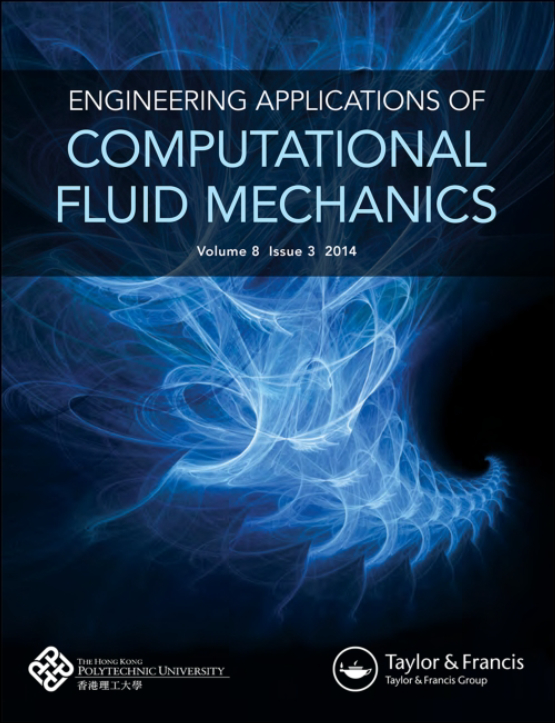Submit a Manuscript to the Journal
Engineering Applications of Computational Fluid Mechanics
For an Article Collection on
Machine Learning for Fluid Dynamics
Manuscript deadline
30 September 2024


Article collection guest advisor(s)
Professor Weiwei Zhang,
School of Aeronautics, Northwestern Polytechnical University, China
[email protected]
Assistant Professor Lu Lu,
Yale University, USA
[email protected]
Professor Jiaqing Kou,
Northwestern Polytechnical University, China
[email protected]
Machine Learning for Fluid Dynamics
In recent decade, the transformative power of data science and machine learning, coupled with the burst of massive flow data, has shaped an artificial intelligence paradigm in fluid mechanics. This intersection of fluid mechanics and machine learning is spearheading a wave of groundbreaking advancements, especially in research areas such as aerospace, civil engineering, mechanical engineering, wind engineering, power energy, and naval engineering. Recent endeavors in this area have demonstrated the remarkable capabilities of these approaches.
So far, machine learning for fluid dynamics has unlocked unprecedented potential for understanding the mechanism of complex fluid behaviors, simulating complex flow physics with greater accuracy, as well as optimizing engineering designs more efficiently. This synergy is not merely an enhancement but a revolutionary step that redefines the boundaries and methodologies in fluid mechanics, opening a realm of possibilities for advanced research and application in the field. There is a pressing need for comprehensive research to refine and extend the applicability of these innovative methods, to improve the current research paradigms in fluid dynamics. However, significant efforts are yet to be made in order to fully embed this paradigm across a broader spectrum of the research community. Moreover, challenges persist, particularly regarding the generalizability and explainability of these methods.
This special collection communicates the recent advances of machine learning for fluid dynamics, with an emphasis on computational fluid dynamics. All topics that demonstrate the integration of machine learning in fluid mechanics, showcases novel methodologies, or applies these innovations to real-world engineering challenges, are welcomed. Potential topics include (but not limited to): mechanism analysis, numerical methods, data-driven flow modelling, turbulence modelling, multiphysics simulation, flow control, design optimization, etc.
Keywords:
- Machine Learning
- Computational Fluid Dynamics
- Data-Driven Methods
- Turbulence Modeling
- Numerical Methods
Wei-Wei Zhang is Chang Jiang Scholars and Excellent Young Scientists in Northwestern Polytechnical University. He received his PhD degree at NPU in 2006. He research on artificial intelligence applications in fluid mechanics including unsteady aerodynamics, aeroelastics, and flow control. He has published over 100 articles in premier international journals. He is now Director of the International Joint Institute of Intelligence in Fluid Mechanics, vice-chairman of CARS and deputy director of fluid-structure interaction mechanics committee of CSTAM. He is Associate Editors of 5 international Journals and several Chinese Journals.
Lu Lu is an Assistant Professor in the Department of Statistics and Data Science at Yale University. Prior to joining Yale, he was an Assistant Professor in the Department of Chemical and Biomolecular Engineering at University of Pennsylvania from 2021 to 2023, and an Applied Mathematics Instructor in the Department of Mathematics at Massachusetts Institute of Technology from 2020 to 2021. He obtained his Ph.D. degree in Applied Mathematics at Brown University in 2020. His current research interest lies in scientific machine learning, including theory, algorithms, software, and its applications to engineering, physical, and biological problems. His broad research interests focus on multiscale modeling and high performance computing for physical and biological systems.
Jiaqing Kou now is a full Professor of Northwestern Polytechnical University. He received his PhD in ETSIAE-School of Aeronautics, Universidad Polit´ecnica de Madrid, and got Alexander von Humboldt Postdoctoral Research Fellow in Aachen University. Now he is the Associate Editor of Aerospace Science and Technology, and Young Editorial Board of Applied Mathematics and Mechanics (Chinese).
All manuscripts submitted to this Article Collection will undergo a full peer-review; the Guest Advisor for this Collection will not be handling the manuscripts (unless they are an Editorial Board member).
Please review the journal scope and author submission instructions prior to submitting a manuscript.
The deadline for submitting manuscripts is [30/09/2024].
Please contact Agnes Zhou at [email protected] with any queries and discount codes regarding this Article Collection.
Please be sure to select the appropriate Article Collection from the drop-down menu in the submission system.
Benefits of publishing open access within Taylor & Francis
Global marketing and publicity, ensuring your research reaches the people you want it to.
Article Collections bring together the latest research on hot topics from influential researchers across the globe.
Rigorous peer review for every open access article.
Rapid online publication allowing you to share your work quickly.
Looking to Publish your Research?
Find out how to publish your research open access with Taylor & Francis Group.
Choose open accessSubmission Instructions
All manuscripts submitted to this Article Collection will undergo desk assessment and peer-review as part of our standard editorial process. Guest Advisors for this collection will not be involved in peer-reviewing manuscripts unless they are an existing member of the Editorial Board. Please review the journal Aims and Scope and author submission instructions prior to submitting a manuscript.